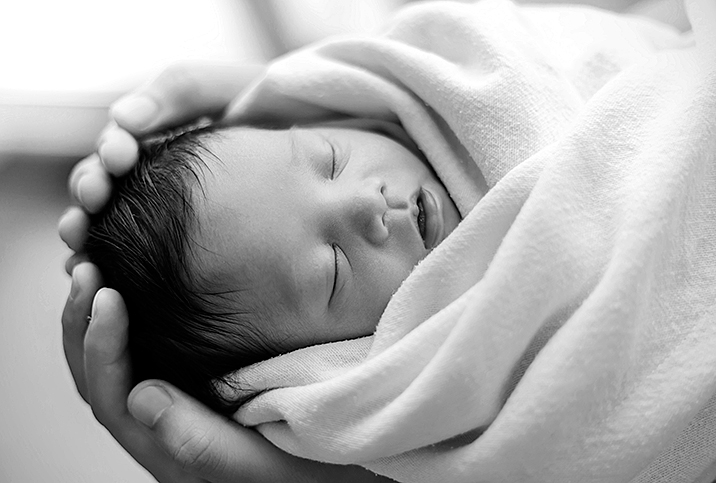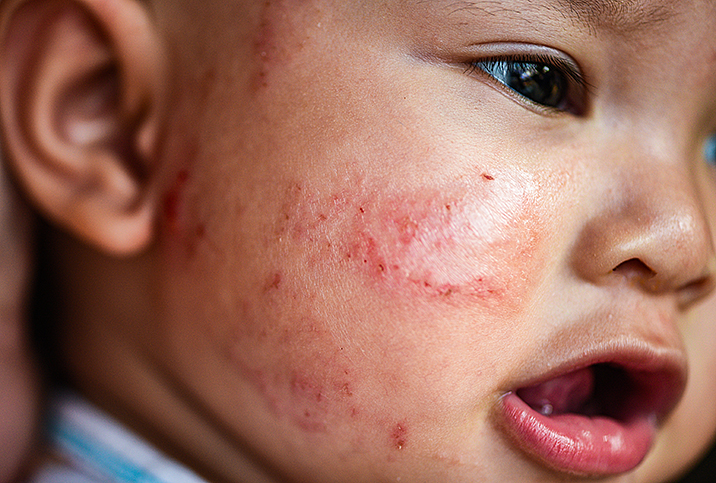What Your Scent Tells Your Baby—and Vice Versa

If you've had a child, you may have noticed a strange phenomenon: that you enjoy the scent of your baby. As weird as that may sound, it's actually completely natural and it's called "odor communication."
Seeking the aroma of your baby is a natural, frequent phenomenon that occurs in more than 90 percent of mothers with a child under 1 year old. Research on this habit indicates that parents, especially mothers, seek their infant's scent multiple times per day. There are two prominent reasons that mothers might give their baby a sniff: to induce loving and affectionate feelings or to check hygiene.
Newborns also use smell to connect feelings of trust to their caregivers and reduce the fear of strangers. Smell is a powerful social communication tool that remains intact throughout the lifespan. And it all begins before birth.
Scent as communication
The ability of a baby to recognize a mother's scent can play a significant role in their social development.
"As your baby learns who you are, they begin to develop feelings of attachment, which will provide security in their relationships throughout life," said Christina Gabel, C.N.M., chief certified nurse midwife at Providence Mission Hospital in Mission Viejo, California.
Scent is a powerful communicator and activates areas of the brain tied to memory.
"Each time your child cries with hunger, you appear to feed him. Each time he is upset, you comfort him until he feels better," Gabel explained. "This sense of security sets the stage for ease of trust with others and the development of an internal ability to self-soothe."
Odor communication facilitates relationship building
Science on odor communication reveals that emotional messages are picked up through scent, signaling familiarity and providing comfort, all vital aspects of relationship development.
"There is a common finding that when mother isn't around, and a baby becomes fussy, simply placing an article of mother's clothing next to baby often results in the infant calming down," said Kecia Gaither, M.D., director of perinatal services at NYC Health + Hospitals/Lincoln in the Bronx in New York City. "The infant is responding to the smell of mother. Mother's scent acts as a signal for security in the baby."
The process starts before birth
Odor communication has been so fundamental to survival during the evolution of humans that it begins in the womb.
"Babies recognize their mother's scent before they are even born. Their sense of smell develops early on during pregnancy, and the first smell babies are exposed to is the odor of their mothers' amniotic fluid," Gabel explained. "Within a few days after birth, your baby knows your smell."
Fetuses are bathed in amniotic fluid, which transmits their mother's chemical scent makeup. This same scent signature is found in mother's milk, providing a signal to the infant to nurse. Breasts also give off a scent, guiding newborns to seek sustenance there.
"Breast odors from mother are felt to exert a pheromone-type effect on the 'rooting' behavior seen in newborns searching for the breast," Gaither said.
Scent helps strengthen familiarity and bonding
Multiple studies indicate that newborns recognize and prefer the smell of their own mother's body odor and breast milk, even within the first few days after birth.
"After birth, babies use all of their senses to get to know you and the world around them, including their sense of smell," Gabel said. "By day three, your baby can differentiate the smell of your breast milk from someone else's."
A 2015 study published in the journal Breastfeeding Medicine found even just the smell of their mother's breast milk had a calming effect on premature babies.
"As one of the first people who nurtures them, it's no wonder that your smell seems to make your baby feel secure," Gabel said. "Studies have shown that babies' pain can be reduced during procedures, such as drawing of a sample of blood from the heel, for a newborn if they smell their mothers' amniotic fluid, hospital gown with body odor or breast milk."
'By day three, your baby can differentiate the smell of your breast milk from someone else's.'
Since newborns have an underdeveloped visual sense, the olfactory system (the structures that support the sense of smell) is a vital communication tool for building trust and bonding in the early months. Before birth, the scent of amniotic fluid provides a clear message of the mother's scent. After birth, this scent information helps the baby feel safe and provides comfort. While the visual system begins to develop, the olfactory system supports and provides context for familiarity, assisting the facial recognition that comes later.
Mothers can recognize the scent of their baby apart from others, even with eyes closed, and the act of inhaling the smell of a newborn activates reward centers in the brain, creating a positive feedback loop between mother and baby.
A communication system that lasts through life
Odor communication doesn't stop after infancy. It is a powerful sense developed in the womb, fostered through connecting scent with trust and familiarity, and utilized in everything from kin recognition to mate selection. A parent then uses odor communication to recognize and bond with their baby, continuing the cycle.


















